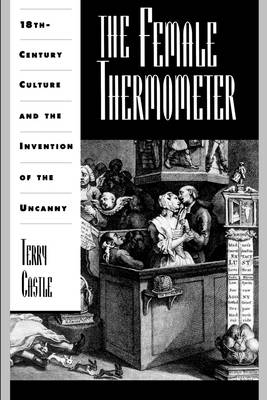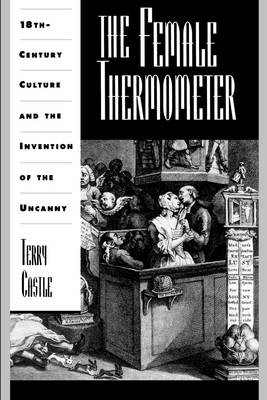
Je cadeautjes zeker op tijd in huis hebben voor de feestdagen? Kom langs in onze winkels en vind het perfecte geschenk!
- Afhalen na 1 uur in een winkel met voorraad
- Gratis thuislevering in België vanaf € 30
- Ruim aanbod met 7 miljoen producten
Je cadeautjes zeker op tijd in huis hebben voor de feestdagen? Kom langs in onze winkels en vind het perfecte geschenk!
- Afhalen na 1 uur in een winkel met voorraad
- Gratis thuislevering in België vanaf € 30
- Ruim aanbod met 7 miljoen producten
Zoeken
€ 186,95
+ 373 punten
Omschrijving
The work of leading scholar Terry Castle, called by the New York Times "always engaging...consistently fascinating," has helped to revolutionize eighteenth-century studies. The Female Thermometer brings together Castle's essays on the phantasmagoric side of eighteenth-century literature and culture. Taking as her emblem the fanciful "female thermometer," an imaginary instrument invented by eighteenth-century satirists to measure levels of female sexual arousal, Castle explores what she calls the "impinging strangeness" of the eighteenth-century imagination--the ways in which the rationalist imperatives of the age paradoxically worked to produce what Freud would later call the uncanny. In essays on doubling and fantasy in the novels of Defoe and Richardson, sexual impersonators and the dream-like world of the eighteenth-century masquerade, magic-lantern shows, automata, and other surreal inventions of Enlightenment science, and the hallucinatory obsessions of Gothic fiction, Castle offers a haunting portrait of a remarkable epoch. Her collection explores the links between material culture, gender, and the rise of modern forms and formulas of subjectivity, effectively rewriting the cultural history of modern Europe from a materialist and feminist perspective.
Specificaties
Betrokkenen
- Auteur(s):
- Uitgeverij:
Inhoud
- Aantal bladzijden:
- 288
- Taal:
- Engels
- Reeks:
Eigenschappen
- Productcode (EAN):
- 9780195080988
- Verschijningsdatum:
- 4/05/1995
- Uitvoering:
- Paperback
- Formaat:
- Trade paperback (VS)
- Afmetingen:
- 154 mm x 232 mm
- Gewicht:
- 449 g

Alleen bij Standaard Boekhandel
+ 373 punten op je klantenkaart van Standaard Boekhandel
Beoordelingen
We publiceren alleen reviews die voldoen aan de voorwaarden voor reviews. Bekijk onze voorwaarden voor reviews.









